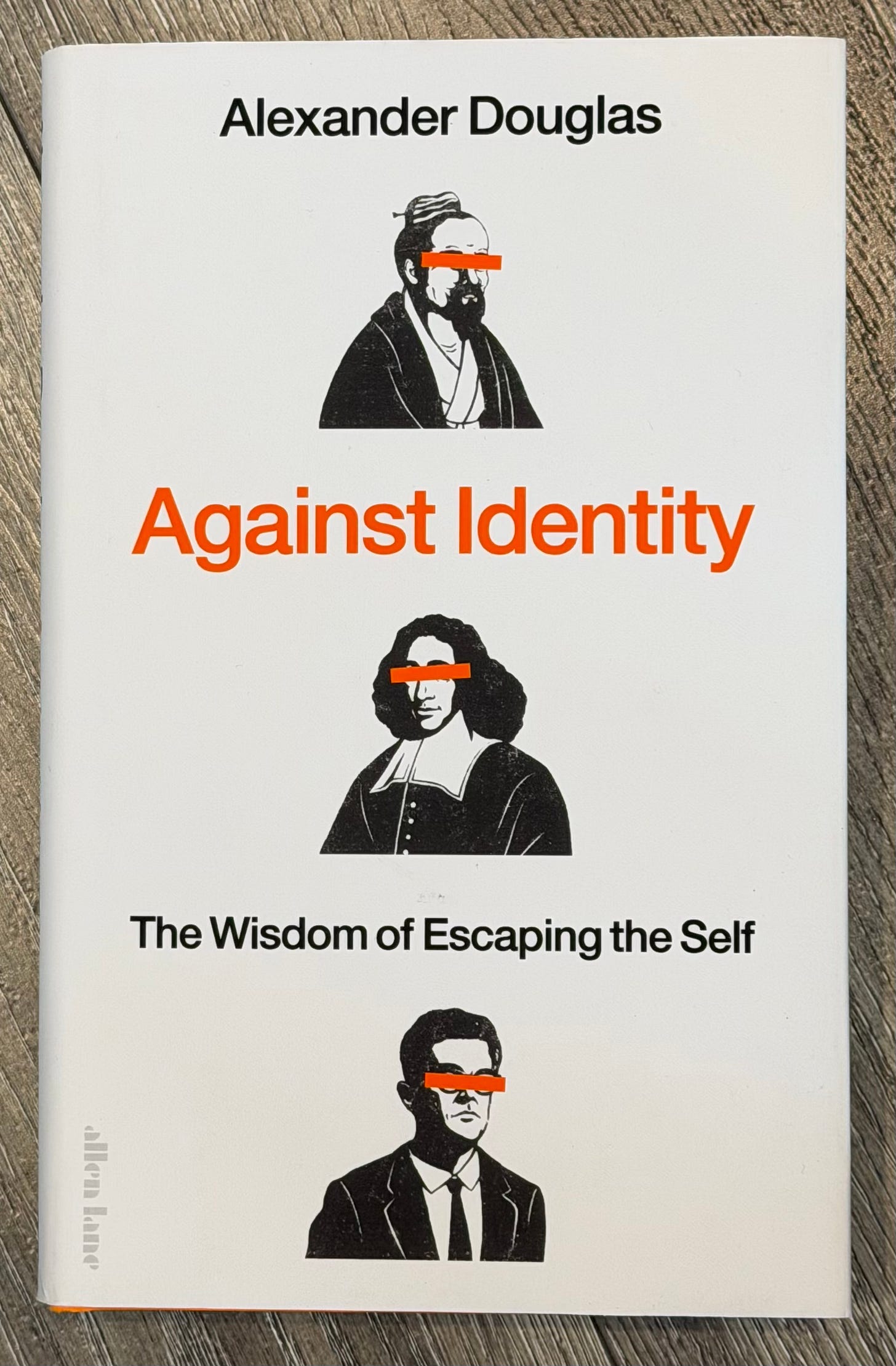Review: Against Identity
Review of “Against Identity: The Wisdom of Escaping the Self” by Alexander Douglas
We live in an era obsessed with personal branding; LinkedIn tells us to cultivate our professional identity, Instagram demands aesthetic coherence, self-help gurus insist we “find ourselves”. Western individualism has reached the point where a marketable identity is treated as essential to success and wellbeing.
But what if all of this is backwards? What if the radical alternative of having no identity at all is what we actually need?
Alexander Douglas’s “Against Identity: The Wisdom of Escaping the Self” takes this counterintuitive stance, drawing primarily on three major thinkers from three different, but thematically connected, eras - Zhuangzi, Spinoza, and Girard - to argue that our obsession with coherent identities is not only limiting but actively harmful.
That ought to be controversial. There’s a lovely thread in the book about the “true self” as a spirit of spontaneity rather than a fixed essence. That reframing is both liberating and, for many, a bit terrifying. If the self is not a noun but a verb, what do we anchor to when life gets chaotic? The answer here is not to anchor at all, just to sail with better maps. Some days that will resonate. Other days you will want a harbor.
In the quest for letting go of our identity, it’s worth contemplating a little about how much of it is ours to begin with. As Oscar Wilde has said:
Most people are other people. Their thoughts are someone else’s opinions, their lives a mimicry, their passions a quotation.
Fully embracing the irony in quoting that, that is, of course, as true as it is uncomfortable. Where do you get the elements that make up your identity? From other people. From other beings. How much of it is really as original, as unique, as we would like to believe?
Is any of it original? Douglas argues not - and that realizing this is the first step to escape.
As a reading experience, I thoroughly enjoyed the book as a whole. In parts, I got lost in the somewhat painful detailed philosophical translations and textual analyses, and there are a couple of flat-out wrong statements too; it is, for example, demonstrably false that “most people broadcast more than they receive” when it comes to the attention economy. For the most part, these are minor distractions.
Other passages I found genuinely profound and impactful. The loss of identity is very much an aspirational thing - Douglas himself concedes to seeing only ‘glimmers of escape’, which is probably as much as most of us can hope for. Yet I found myself pondering an alternative: what about adopting an identity of change itself? It seems to me that this book, and the philosophers discussed, view identities as something that can change, but that are also holding us back. Can’t we embrace change or transformation as our defining characteristic? This book doesn’t adequately grapple with that possibility.
It’s an unapologetically philosophical book, so one does not expect there to be a list of ‘actionable insights’; even so, it does come close at times. One thing we should all stop doing right now is incorporating political opinions as elements of our identity. As Douglas observes:
Upton Sinclair once quipped: ‘It is difficult to get a man to understand something, when his salary depends upon his not understanding it’. Well, try getting somebody to understand something when their identity depends upon not understanding it. If they do not even realize that they are protecting their identity, their mind will confabulate prolifically to explain their resistance to understanding.
Identities become limiting in a surprising number of places; one could argue most, if not all, places. On academia, Douglas notes how “peer review, a system of academic community policing, whose ostensible purpose is to filter out substandard research, functions also to enforce mediocrity.“ Academia is sometimes incapable of appreciating alternatives “since doing so would be incompatible with its self-conception as a community that has already reached the optimum balance of innovation, excellence and diversity.“
This is highly counter-productive, because what our time needs is more innovation: new ways of thinking, being, and acting to deal with challenges we did not foresee when we settled into our current forms and habits. Yet we also have a surveillance and identity enforcement regime – and people do not innovate well under such conditions.
It is also not helpful that innovation from within groups is frowned upon the most. Douglas notes:
Maintaining the correctness of its own identity means condemning those who diverge from it. This is why internal critics in religious or political movement are dealt with much more harshly than external enemies the movement claims to be united against, or why artistic movements often demean the achievements of their most innovative members.
Maybe glimmers of escape is enough, for now? If identities are socially reinforced, then the incremental win is to weaken the surveillance, widen the aperture, and make exits cheap. Reward people for changing their minds in public. None of that needs a wholesale identity revolution – it just (’just’) needs people choosing not to applaud and to resist when the purity tests begin.
Rating: 4.5 out of 5
Dog-ear index: 11.5
Who is it for: Those frustrated by the pressure to “build a personal brand” and cultivate a coherent identity, plus anyone who suspects their carefully curated identity might be a prison rather than an expression of freedom.
[reminder: I highlight important parts of the books I read, and dog-ear the really important pages. The dog-ear index is simply the average number of dog-eared pages per 100 pages]
Product link for reference only; please support your local bookstore where possible: https://www.amazon.com.au/Against-Identity-Wisdom-Escaping-Self/dp/0241648211/



I was also think about the concept of purity towards the end of your writeup. Did you see this article https://unherd.com/2020/01/cast-out-how-knitting-fell-into-a-purity-spiral/ ?